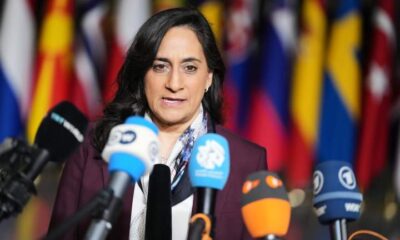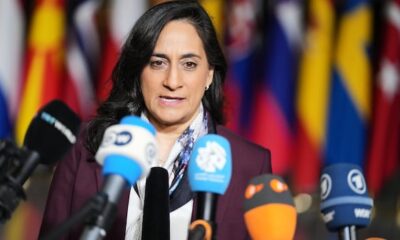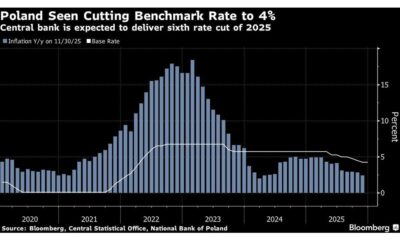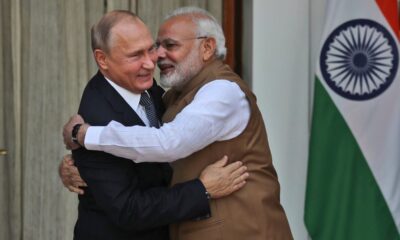World
Russia Threatens Decisive Action Amid NATO Tensions
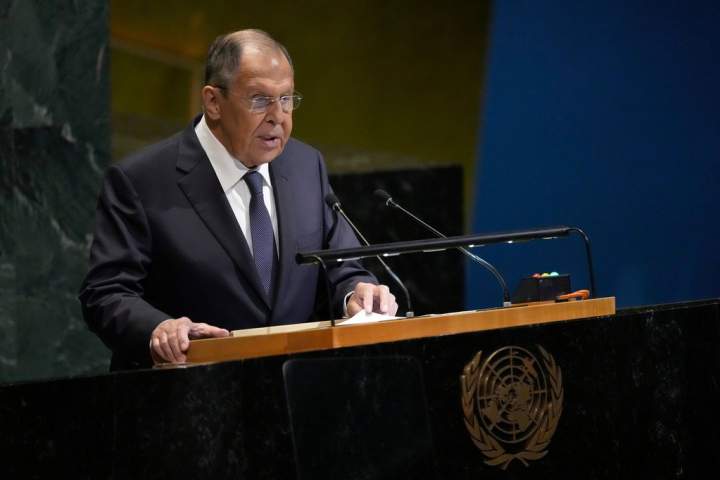
Tensions between Russia and NATO nations escalated as Russian Foreign Minister Sergey Lavrov asserted that any aggression towards Russia would elicit a “decisive response.” Speaking at the U.N. General Assembly on September 30, 2023, Lavrov emphasized that Russia has no intention of attacking Europe, yet remains vigilant against perceived threats.
Recent incidents involving unauthorized flights near NATO airspace have heightened concerns across Europe. NATO has attributed these incursions to Russian aircraft, particularly following reports of drones being downed by NATO jets over Poland. Additionally, Estonia has claimed that Russian fighter jets entered its airspace, remaining there for approximately 12 minutes. Russia has refuted these allegations, arguing that its planes did not breach Estonian airspace and that the drones targeting Poland were misdirected due to Ukrainian signal-jamming.
European leaders interpret these actions as deliberate provocations aimed at testing NATO’s response capabilities. In light of these developments, NATO has issued a warning, stating it will utilize all necessary means to protect against further violations of its airspace.
At the U.N., Lavrov maintained that it is Russia that faces threats. He reiterated, “Russia has never had and does not have any such intentions” of attacking European or NATO countries. He warned that any aggression against Russia would be met with a “decisive response,” urging NATO and the European Union to recognize this reality.
As the conflict in Ukraine enters its third year, Lavrov noted the international community’s widespread condemnation of Russia’s actions. In a shift from previous statements, U.S. President Donald Trump expressed optimism regarding Ukraine’s ability to reclaim territory lost to Russia. This marked a notable change from Trump’s prior suggestions that Ukraine might need to make concessions.
In early August 2023, Trump and Russian President Vladimir Putin discussed the ongoing situation but failed to reach an agreement to end the conflict. Lavrov highlighted the significance of continued dialogue with the U.S., stating, “In the approaches of the current U.S. administration, we see a desire not only to contribute to ways to realistically resolve the Ukrainian crisis, but also a desire to develop pragmatic cooperation.”
Despite this seemingly conciliatory tone, Lavrov’s remarks towards NATO and Western nations remained critical. He noted that ongoing discussions and negotiations are vital, especially considering the implications for global stability.
The Ukrainian President Volodymyr Zelenskyy, addressing the assembly, reiterated his call for international support to expel Russian forces from Ukraine, warning that complacency could endanger other nations. He asserted, “Ukraine is only the first,” indicating a broader threat posed by Russian aggression.
Russia has provided various justifications for its military actions in Ukraine, citing concerns over NATO’s eastward expansion and the need to protect Russian-speaking populations in eastern Ukraine. Conversely, Ukraine and its allies have condemned Russia’s invasion as an unprovoked act of aggression.
In addition to the Ukraine conflict, Lavrov addressed the ongoing situation in Gaza, condemning the surprise attack by Hamas on Israel on October 7, 2023. He stressed, however, that “there is no justification” for Israel’s retaliatory actions that have resulted in significant Palestinian civilian casualties.
According to the Gaza Health Ministry, Israel’s military operations have claimed over 65,000 Palestinian lives, with approximately half identified as women and children. Lavrov also opposed any potential Israeli annexation of the West Bank, emphasizing its significance to Palestinian statehood.
As the international community continues to grapple with these complex issues, the call for a two-state solution to the Israeli-Palestinian conflict remains a point of contention. Israeli Prime Minister Benjamin Netanyahu has consistently rejected the notion of a Palestinian state, asserting that it would reward Hamas.
The ongoing dialogues at international forums like the U.N. highlight the urgent need for resolution in both the Ukrainian and Israeli-Palestinian conflicts, with global leaders seeking pathways to peace amidst rising tensions.
-

 Politics4 weeks ago
Politics4 weeks agoSecwepemc First Nation Seeks Aboriginal Title Over Kamloops Area
-

 World5 months ago
World5 months agoScientists Unearth Ancient Antarctic Ice to Unlock Climate Secrets
-

 Entertainment5 months ago
Entertainment5 months agoTrump and McCormick to Announce $70 Billion Energy Investments
-

 Science5 months ago
Science5 months agoFour Astronauts Return to Earth After International Space Station Mission
-

 Lifestyle5 months ago
Lifestyle5 months agoTransLink Launches Food Truck Program to Boost Revenue in Vancouver
-

 Technology3 months ago
Technology3 months agoApple Notes Enhances Functionality with Markdown Support in macOS 26
-

 Lifestyle3 months ago
Lifestyle3 months agoManitoba’s Burger Champion Shines Again Amid Dining Innovations
-

 Top Stories2 months ago
Top Stories2 months agoUrgent Update: Fatal Crash on Highway 99 Claims Life of Pitt Meadows Man
-

 Politics4 months ago
Politics4 months agoUkrainian Tennis Star Elina Svitolina Faces Death Threats Online
-

 Sports5 months ago
Sports5 months agoSearch Underway for Missing Hunter Amid Hokkaido Bear Emergency
-

 Politics5 months ago
Politics5 months agoCarney Engages First Nations Leaders at Development Law Summit
-

 Technology5 months ago
Technology5 months agoFrosthaven Launches Early Access on July 31, 2025

